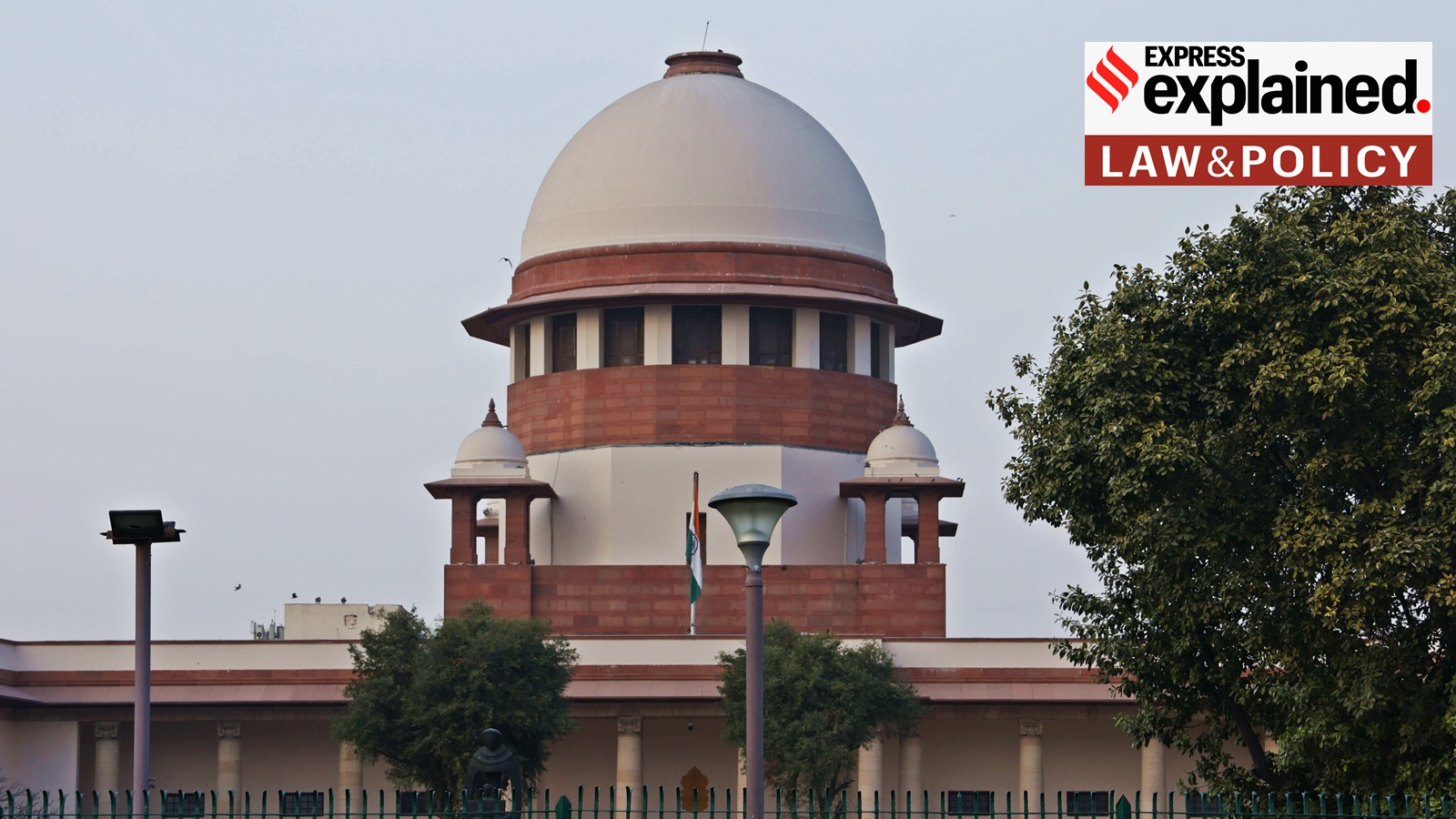Should Shariat law apply to former Muslims in succession matters? The question before SC
A former Muslim petitioner has said that people who do not want to be governed by the Muslim Personal Law must be allowed to be governed by the secular Indian Succession Act of 1925. Why is the court considering the issue? We explain.
 While the CJI initially said Muslims in India are governed by Shariat, irrespective of whether they choose to believe in their religion or not, the bench eventually agreed to hear the case. (Express file photo by Prem Nath Pandey)
While the CJI initially said Muslims in India are governed by Shariat, irrespective of whether they choose to believe in their religion or not, the bench eventually agreed to hear the case. (Express file photo by Prem Nath Pandey)The Supreme Court on Monday (April 29) said it will examine the question of whether a former Muslim will be governed by Muslim personal law — the Shariat Act of 1937 — or by the secular laws of the country in matters of succession.
Agreeing to consider the “important point”, a bench of Chief Justice of India DY Chandrachud and Justices JB Pardiwala and Manoj Misra issued notice on a Kerala-based petitioner’s plea.
What is this case?
The court was acting on the plea of Safiya PM, the general secretary of an organisation of former Muslims in Kerala. The plea sought a “declaration that persons who do not want to be governed by the Muslim Personal Law must be allowed to be governed by the secular law or the Indian Succession Act, 1925, both in intestate and testamentary succession cases.”
A situation where the deceased has no will drawn up is called intestate succession. Whereas, when the property is distributed as per the deceased’s will, it is known as testamentary succession. In India, issues related to succession are governed by the Indian Succession Act of 1925, the Hindu Succession Act of 1956 and the Muslim personal law or Shariat.
In this case, the petitioner cited the Supreme Court’s 2018 ruling in the Sabarimala temple entry case, which highlighted the right to freedom of religion under Article 25 of the Indian Constitution.
Safiya said that freedoms under this Article must include the right to not believe in religion. She added that someone who leaves their faith shouldn’t have to face “any disability or disqualification” in matters of inheritance or “other important civil rights”. Her father hadn’t officially left his religion but was a non-believer, which resulted in the “peculiar problem” for her in inheritance matters, she said.
In general, how do Muslim inheritance laws work in India?
Inheritance for Muslims in India is governed by the Muslim Personal Law (Shariat) Application Act, 1937. It codifies the Shariat or the law governing Muslims and is made up of Quranic principles, teachings, and the Hadith or practices of Prophet Mohammad.
According to it, 12 categories of legal heirs or sharers get a share in the inheritance, including the husband, wife, daughter, son’s daughter (or son’s son and so on), father, paternal grandfather, and others.
Apart from sharers, another category of heirs called “residuaries” includes aunts, uncles, nieces, nephews, and other distant relatives. The value of their share depends on several scenarios.
For example, a wife takes 1/8 share of her husband’s property upon his death if they have lineal descendants like children. If not, she takes 1/4th share. Moreover, a Muslim’s estate can only pass to a Muslim, which prejudices the wife or children following another religion, as The Indian Express reported earlier.
Another important rule is that daughters cannot inherit more than half of what their brothers inherit. The rationale here is that under Muslim law, a female shall receive mehr and maintenance from her husband upon marriage, while males solely have their ancestor’s property for inheritance. These laws also emanate from customs, which said that the males were responsible for maintaining their wives and children.
Under Shariat, only 1/3rd of the estate can be willed in favour of anyone and the remainder will have to be divided as per the complex religious law. Therefore, a Muslim couple has no way to make someone their sole heir.
In the present case, advocate Prashant Padmanabhan, who represented Safiya, told the court that these provisions would adversely affect the petitioner. Notably, many Muslims choose to register their marriages under the Special Marriage Act, 1954, which is not based on religion. This is done to avail the option of being governed by a secular inheritance law like the 1925 Act.
The provisions relating to this case
In her petition, Safiya approached the court seeking a declaration to not be governed by the Shariat for matters under Sections 2 and 3 of the 1937 Act.
Section 2 deals with the application of personal laws. It says that in some areas, such as intestate succession and special property of females, “the rules of decision in cases where the parties are Muslims, shall be the Muslim Personal Law (Shariat)”.
In the SC’s 2017 ruling in ‘Shayara Bano vs. Union of India’, which struck down the practice of triple talaq as unconstitutional, the court reaffirmed that Section 2 mandates Muslim “personal law” would be exclusively adopted as “the rule of decision” in matters listed under Section 2.
Further, Section 3 of the Act says that anyone who satisfies to the prescribed authority that (i) he is Muslim (ii) competent to contract under the Indian Contract Act, 1872, and (iii) a resident of the territories where the Act applies, can have Section 2 apply to him and his descendants. Simply put, this allows one to make a declaration for wanting to be governed by the Sharia law.
What about the application of Sharia for people who renounce their faith?
At present, Muslims who wish to renounce their faith are also bound by Shariat law – unless they formally declare that they wish to opt out under the 1937 Act. But, doing so would render them without a law to govern aspects of inheritance and succession, because Section 58 of the Indian Succession Act specifically excludes Muslims from its purview.
One exception exists in testamentary succession. In cases where the subject matter of property is an immovable property situated in the states of West Bengal, Chennai, and Bombay, Muslims are bound by the 1925 Act.
What did the court decide?
While the CJI initially said Muslims in India are governed by Shariat, irrespective of whether they choose to believe in their religion or not, the bench eventually agreed to hear the case. LiveLaw reported the CJI as saying that as per Section 3 of the 1937 Act, one has to make a specific declaration to be governed by Shariat.
Simply, the court said that although one can declare not to be governed by the Shariat law, the Indian Succession Act creates a “vacuum” for people who choose to leave their faith but are left without any secular law to govern aspects of inheritance.
Taking note of the fact that there is no secular law on wills and legacies for Muslims, the court sought responses from the Central and Kerala governments, while directing Attorney General of India R. Venkataramani to nominate a law officer to assist the court. The case will now be taken up in July.
- 01
- 02
- 03
- 04
- 05





































